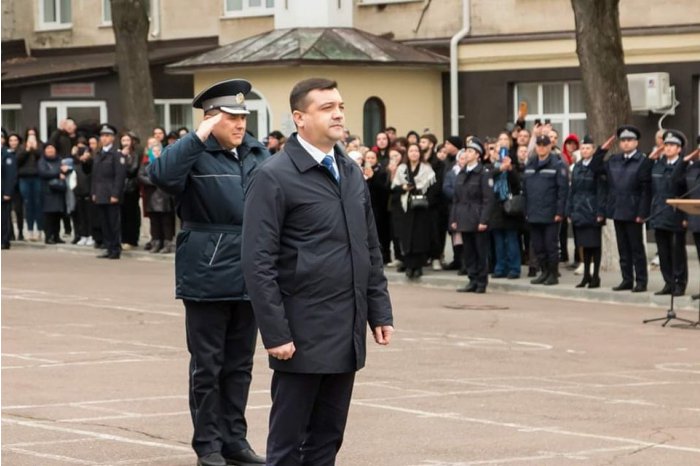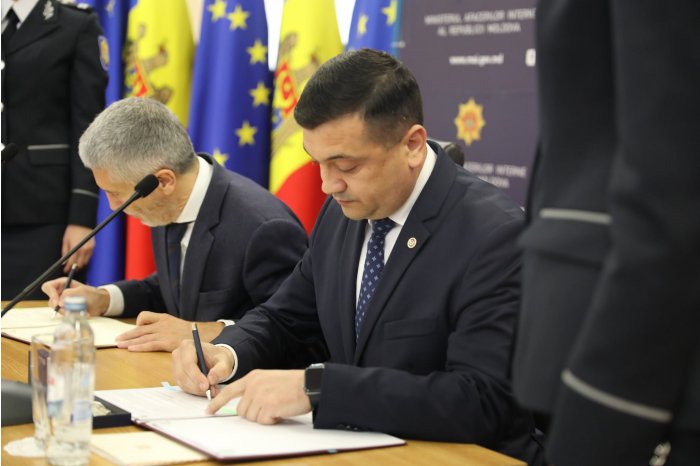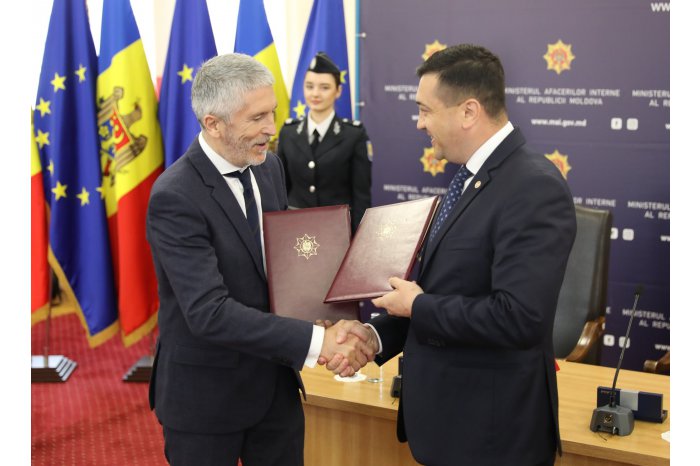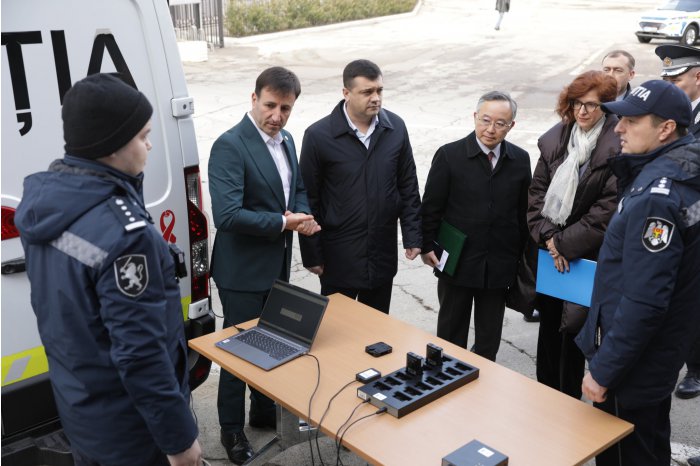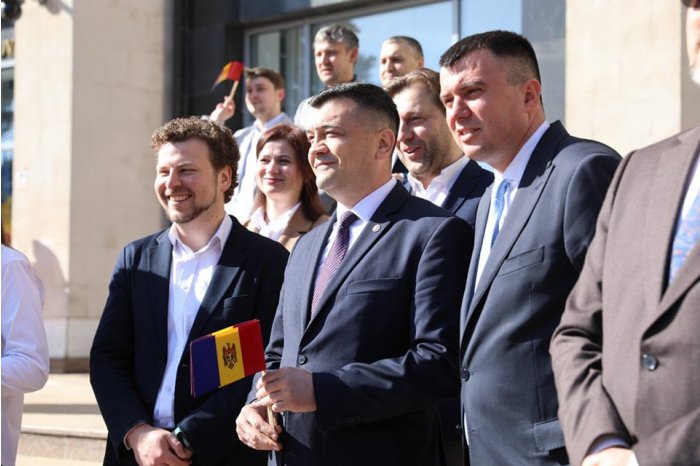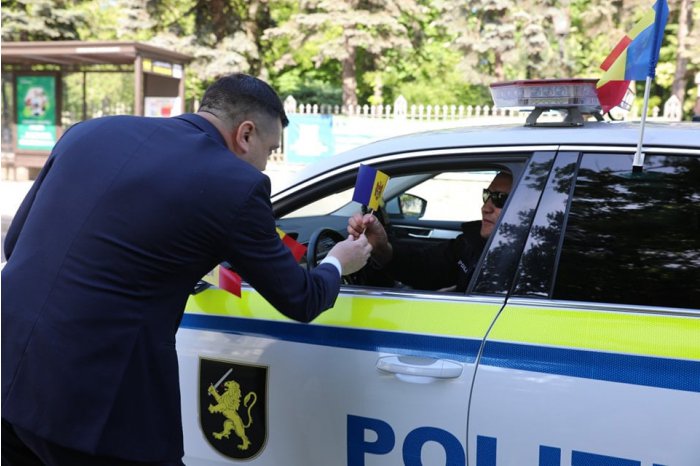EUROPEAN MOLDOVA // Minister of Internal Affairs: Adopting European path requires full mobilization of internal affairs system to effectively implement state policy in security and public order
19:11 | 03.05.2024 Category: Interview, Event
*Moldova applied for EU membership on 3 March 2022
*Moldova was granted EU candidate status on 23 June 2022
*On 14 December 2023, the European Council decided to open accession negotiations with Moldova
*Moldova undergoing assessment of the alignment of national legislation with European Union law, a first step for our state’s accession to the EU
*Authorities aim for Moldova to join the EU by 2030
Interview given to MOLDPRES State News Agency by Interior Minister Adrian Efros
MOLDPRES: Minister Adrian Efros, Chapter 24 of the negotiations on Moldova's accession to the European Union refers to a "professional, reliable and efficient" police structure. What are currently the main challenges of the internal affairs system to be overcome in order to meet EU standards?
Adrian Efros: I would like to mention that at national level, the Ministry of Interior is responsible for Chapter 24 "Justice, Freedom and Security" of the EU acquis. This chapter is one of the 33 accession negotiation chapters covering important EU policy issues.
The Ministry of Interior is responsible for coordinating and implementing in a step-by-step way together with the other responsible national authorities, the necessary reforms to align the country's legislation and practices in the areas of the fight against organised crime, law enforcement cooperation, counter-terrorism and prevention of radicalisation, judicial cooperation in criminal, civil and commercial matters.
In order to align with EU standards for a "professional, reliable and efficient" police structure, the Moldovan internal affairs system needs to focus on revising the initial training curriculum in order to streamline the training process and adequately prepare police staff according to European requirements.
Getting closer to the citizens by regionalizing the police, placing more staff in operational services is vital to ensure a professional and efficient response to challenges and to provide quality and accessible public services.
MOLDPRES: In recent years, Moldova's development partners have made significant donations to the National Police - from electronic equipment, body cameras to cars. What kind of assistance are we talking about and what else do Moldovan police officers need today in order to react efficiently and effectively to situations that require their intervention?
Adrian Efros: During 2023, the National Police of the Republic of Moldova benefited from important donations offered by cooperation partners, under bilateral agreements or through external assistance projects, amounting to more than 3 million euros. These donations included IT equipment, body cameras and cars, providing police officers with the necessary means to carry out their responsibilities effectively. At the same time, in 2024, the IGP received donations worth 748 thousand euros, which include modern equipment such as tablets, monitors, body cameras, etc., and which will play a key role in improving the operational capabilities of the police and facilitating the conduct of evidence gathering activities. This support will also help to ensure that human rights are respected during interventions, guaranteeing the fairness of actions carried out by police employees.
MOLDPRES: Which subdivisions of the Ministry of Interior are facing the greatest shortage of employees and what actions are you taking to attract new manpower in the field?
Adrian Efros: Currently, there are over 700 vacancies in the Ministry of Internal Affairs, of which over 350 are in the National Police of the Republic of Moldova, which is also the largest subdivision of the Ministry of Internal Affairs.
In order to attract new manpower to the internal affairs system, several actions have been taken. These include campaigns to inform, raise awareness and familiarise students and graduates of educational institutions about the possibility of employment in the internal affairs system, placing advertisements on social media, participation in job fairs. These actions will contribute to increasing the attractiveness of the system for potential candidates and to creating a favourable environment for work and performance. It is important to highlight the advantages of employment within the system, which includes mandatory state insurance, paid annual leave, paid housing space, free healthcare, stable salary and the opportunity to work in the country and be close to family.
MOLDPRES: The war waged by the Russian Federation against Ukraine has put enormous pressure on the National Police, including due to increased border traffic and the arrival in Moldova of a large number of Ukrainian refugees. How secure are Moldova's borders today?
Adrian Efros: The war in Ukraine has substantially changed the security environment in the region, which has also changed the profile of criminal activity at the state border, especially at the Moldovan-Ukrainian border. On this segment we are witnessing an increase in the activities of criminal groups on the dimension of organising illegal migration.
However, although complicated, the situation is currently under control, thanks to the efforts of my colleagues who perform their daily work with dignity and dedication. The last two years have been a real challenge for the whole team of the Ministry of Interior, which has had to face unprecedented situations.
MOLDPRES: Last year's tragedy at Chisinau International Airport, when a border policeman and a security guard were killed, has exposed gaps in security measures at strategic targets. What action has been taken to ensure that such incidents are ruled out in the future?
Adrian Efros: In order to prevent similar incidents in the future, several measures have been taken at Chisinau International Airport (AIC), including the approval of an Action Plan for 2023-2024, aimed at implementing the recommendations of the Thematic Control Commission. These actions included the operationalisation of the Public Order and Explosive Intervention Service, as well as the start of activities for the authorisation of the Aviation Security Training Centre. In addition, the video monitoring system was expanded and detailed situational plans were set up. In order to strengthen the regulatory framework, standard operating procedures have been regulated and effective mechanisms for surveillance of inadmissible persons on the territory of the country have been set. Staff coverage, continuous recruitment and selection, and equipping employees with special equipment, including explosive detection devices were also ensured. These measures reflect a firm commitment to improving security at the AIC and to preventing any similar incidents in the future.
MOLDPRES: Mr Efros, lately, more and more police officers are reporting bribery attempts by citizens, but anti-corruption officers are also exposing lawmen who claim bribes. What steps are you taking to reduce corruption among MAI employees?
Adrian Efros: In order to fight corruption among employees of the Ministry of Internal Affairs, we are implementing several measures and strategies. For example, trainers from SPIA organize regular trainings on preventing and fighting corruption, promoting integrity, applying rules of ethics and professional integrity for employees of administrative authorities and institutions under the Ministry.
An important aspect I would like to mention is that we actively promote among system employees an organizational culture that discourages misconduct and encourages the reporting of incidents of corruption, ensuring legal protection and confidentiality for police officers who report such incidents, so that they feel safe, without fear of retaliation, when performing their duties.
We collaborate with other national and international institutions and organisations to exchange best practices and experiences in the fight against corruption.
MOLDPRES: On 9 May we mark Europe Day, and citizens are called to participate in a referendum on Moldova's European integration on 20 October. Mr. Minister, please tell us how the National Police would look like and what citizens would gain if Moldova joined the European Union?
Adrian Efros: On 9 May, we mark Europe Day, an emblematic event celebrating history, solidarity, dialogue and collaboration on the European continent. This day symbolises peace and unity and brings us together in the European family, sharing the same fundamental values and principles: democracy, respect for human dignity, equality, freedom, the rule of law and respect for human rights, regardless of race, nationality, religion or colour.
With these fundamental values and principles in mind, citizens are invited to participate on 20 October in the Referendum on the European integration of the Republic of Moldova. This is a national priority, and the adoption of the European path requires the full mobilization of the internal affairs system to effectively implement the state policy in the field of security and public order, to ensure the safety of citizens and to maintain a peaceful climate in society.
It is important to stress that the process of accession to the European Union has already started and the efforts of all those involved are visible to all citizens. Therefore, it is necessary to be aware of the importance of this referendum and actively participate in order to contribute to the European future of the Republic of Moldova.
Thank you for the interview!
Reporter: Ala Ciobanu
